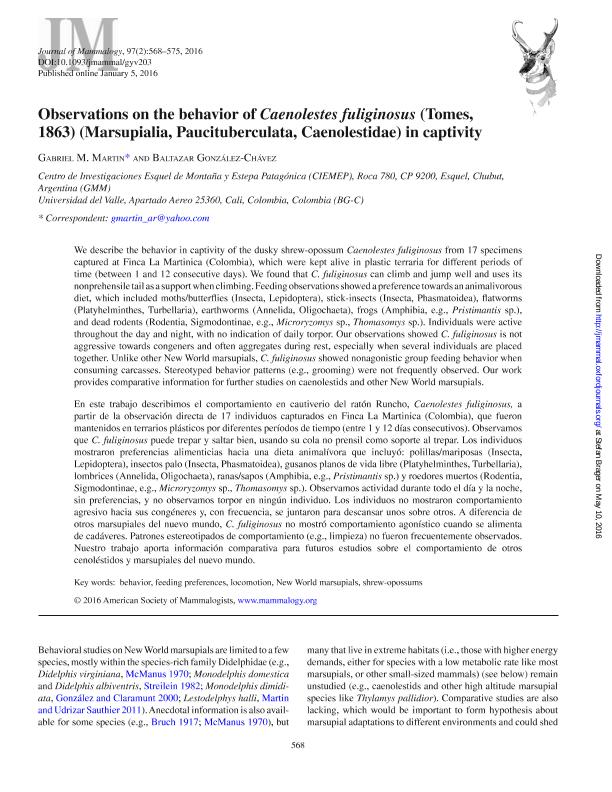Artículo
Observations on the behavior of Caenolestes fuliginosus (Tomes, 1863) (Marsupialia, Paucituberculata, Caenolestidae) in captivity
Fecha de publicación:
03/2016
Editorial:
Alliance Communications Group Division Allen Press
Revista:
Journal of Mammalogy
ISSN:
0022-2372
Idioma:
Inglés
Tipo de recurso:
Artículo publicado
Clasificación temática:
Resumen
We describe the behavior in captivity of the dusky shrewopossum Caenolestes fuliginosus from 17 specimens captured at Finca La Martinica (Colombia), which were kept alive in plastic terraria for different periods of time (between 1 and 12 consecutive days). We found that C. fuliginosus can climb and jump well and uses its nonprehensile tail as a support when climbing. Feeding observations showed a preference towards an animalivorous diet, which included moths/butterflies (Insecta, Lepidoptera), stickinsects (Insecta, Phasmatoidea), flatworms (Platyhelminthes, Turbellaria), earthworms (Annelida, Oligochaeta), frogs (Amphibia, e.g., Pristimantis sp.), and dead rodents (Rodentia, Sigmodontinae, e.g., Microryzomys sp., Thomasomys sp.). Individuals were active throughout the day and night, with no indication of daily torpor. Our observations showed C. fuliginosus is not aggressive towards congeners and often aggregates during rest, especially when several individuals are placed together. Unlike other New World marsupials, C. fuliginosus showed nonagonistic group feeding behavior when consuming carcasses. Stereotyped behavior patterns (e.g., grooming) were not frequently observed. Our work provides comparative information for further studies on caenolestids and other New World marsupials.
Palabras clave:
Behavior
,
Feeding Preferences
,
Locomotion
,
New World Marsupials
,
Shrewopossums
Archivos asociados
Licencia
Identificadores
Colecciones
Articulos(CIEMEP)
Articulos de CENTRO DE INVESTIGACION ESQUEL DE MONTAÑA Y ESTEPA PATAGONICA
Articulos de CENTRO DE INVESTIGACION ESQUEL DE MONTAÑA Y ESTEPA PATAGONICA
Citación
Martin, Gabriel Mario; González Chávez, Baltazar; Observations on the behavior of Caenolestes fuliginosus (Tomes, 1863) (Marsupialia, Paucituberculata, Caenolestidae) in captivity; Alliance Communications Group Division Allen Press; Journal of Mammalogy; 97; 2; 3-2016; 568-573
Compartir
Altmétricas




